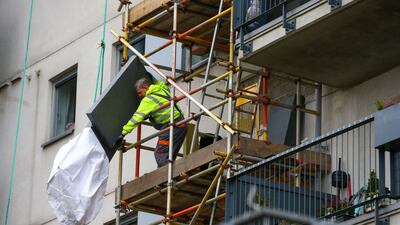Eleven building companies have been named and shamed by UK Housing Secretary Michael Gove for not signing the remediation contract aimed at addressing cladding issues following London's Grenfell Tower fire.
Mr Gove confirmed that 39 developers had signed the contract, which commits them to fund £2 billion worth of repairs to high-rise buildings with unsafe cladding or other fire safety defects.
According to government estimates, there are between 6,000 and 9,000 buildings between 11 and 18 metres high that are deemed unsafe due to cladding or other fire safety defects.
Critics have called for a more comprehensive approach to tackle the issue of unsafe buildings, particularly those affecting trapped leaseholders.
Developers that have not signed up have been warned that they will not be able to start new developments or receive building control approval for existing projects.
The communities secretary also announced the responsible actors scheme, which will ensure that only those committed to building safety will be allowed to build in the future.
The scheme will exclude those that have not signed up to the remediation contract.
Mr Gove said that officials are in discussions with some of the companies that have yet to sign.
The announcement was welcomed by Labour’s Lisa Nandy, the Shadow Communities Secretary, who called for all developers to sign the remediation contract and urgently address the problems of unsafe buildings and free trapped leaseholders.

However, she also criticised that the contract would only cover a fraction of the unsafe buildings estimated to exist.
Clive Betts, chairman of the Levelling Up, Housing and Communities Select Committee, raised concerns that social housing providers may have to cut back on house building if they are not given more funding to fix cladding issues.
He noted that the National Housing Federation had estimated that the cost of remediation for social housing providers would be £6 billion. Mr Gove replied that he was in conversations with the Chancellor of the Exchequer about supporting the social housing sector.
Mr Gove described the announcement as a “significant intervention in the market” but noted that the scale of the crisis justified a radical approach.
The Grenfell Tower fire in June 2017 resulted in 72 deaths and exposed significant problems with the regulation of building safety. In response, the UK government launched the Building Safety Programme the following year, aimed at addressing issues with building safety, particularly with cladding.


